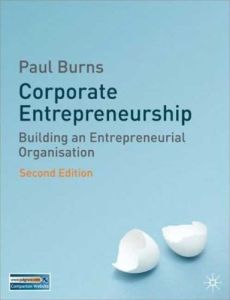Join getAbstract to access the summary!

Join getAbstract to access the summary!
Paul Burns
Corporate Entrepreneurship
Building an Entrepreneurial Organisation
Palgrave Macmillan, 2008
What's inside?
Help your company; help save the economy.
Recommendation
Much of the business world’s enchantment with entrepreneurialism focuses on new start-up companies. Time to reboot. This textbook by professor Paul Burns explains how an established company can recapture the innovative magic of entrepreneurialism. getAbstract recommends this guide to combining the creativity, agility and innovation of an entrepreneurial start-up with the market power, reach and security of a big, established company. Burns covers many facets of the management tactics needed to bring an entrepreneur’s creative drive into the realm of the settled corporation. In this chunky manual, he draws on numerous examples from well-known companies such as Dell and Virgin Airways to put entrepreneurialism in an overall economic context, and he teaches managers how to propel their firms forward by being flexible, eager, and inventive.
Summary
About the Author
Paul Burns is professor of entrepreneurship and dean of the University of Bedfordshire’s school of business in the United Kingdom. He is a former visiting scholar at Harvard Business School.

















Comment on this summary